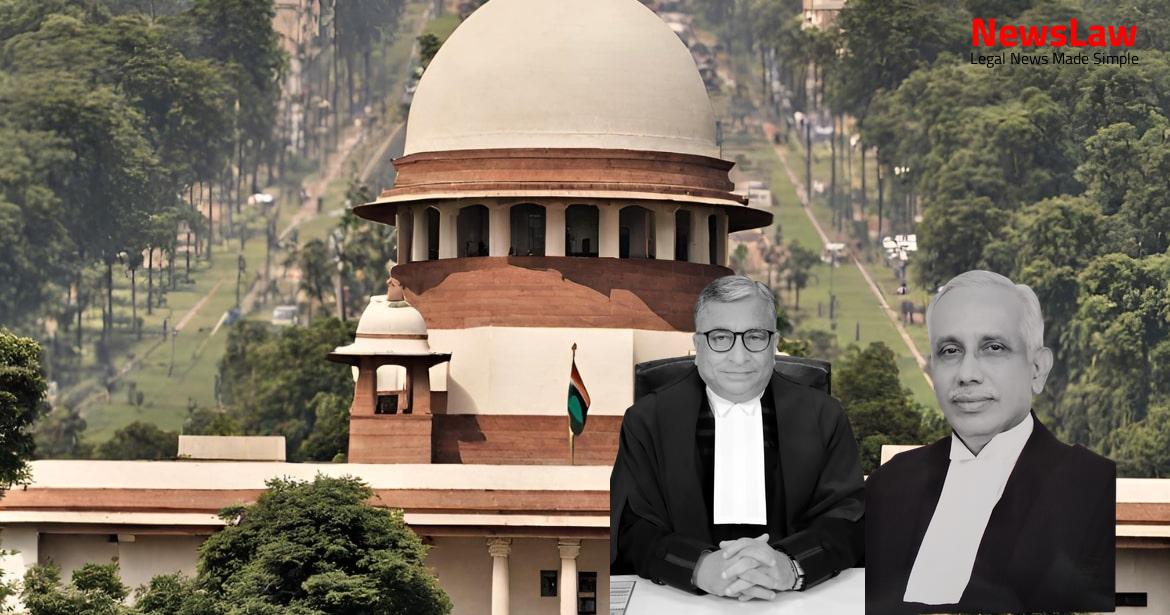Explore the complexities of land tenure rights and the interpretation of the Ceiling Act through a recent court case. The court’s legal analysis delves into the nuances of sub-leases for agricultural purposes and the criteria for acquiring tenure holder status under the Act. Stay informed about the implications and legal intricacies involved in determining land rights under statutory provisions.
Facts
- The lease deed conditions for transfer of land were not followed before creating a sub-lease to the appellant.
- The writ petition transferred to the newly created High Court of Uttaranchal got dismissed for want of prosecution.
- The appellant sub-leased 2.49 acres of land for agricultural purposes.
- Certain land was declared surplus in the hands of the Government Lessee.
- The Prescribed Authority dismissed the application mainly due to the absence of appellant’s possession reflecting in revenue records.
- The High Court dismissed the writ petitions in 2008.
- The appellant’s application under Section 11(2) of the Act of 1960 was dismissed for lack of locus.
- Lala Khushi Ram’s leasehold rights were inherited by Harikishan Lal.
- A restoration application by the appellant was dismissed by the Additional District Judge.
- The Writ Petition was restored to its original number after being allowed in a Special Leave Petition filed by the appellant.
- The High Court recognized the appellants as tenure holders under sub-Section 9(3) of the Ceiling Act.
- However, the court did not grant them the benefit due to their violation of conditions in Clause 9 of the Lease Deed.
Also Read: Assessment of Loss of Earning Capacity in Motor Accident Claim
Issue
- Issue 1: Whether the sub-lessees acquire the status of tenure holder as per the definitions in the Ceiling Act.
- Issue 2: Whether the appellants, as sub-lessees, are actually holding the land on behalf of the original government lessees.
Also Read: Enhancement of Compensation in Workmen’s Compensation Act Case
Arguments
- The appellant contends that he would attain the status of a ‘tenure holder’ as defined in the Ceiling Act.
- As an independent tenure holder, the appellant is entitled to independent assessment of ceiling area.
- The land in the appellant’s tenure cannot be clubbed with the holding of Respondent No 2, the Government lessee.
- The prohibitory conditions in Clause 9 of the lease deed do not apply to sub-leases made for agricultural purposes.
- The sub-lease in question was for agricultural purposes, for the cause of growing more food campaign.
- The High Court erred in holding the sub-lease as void for non-compliance with certain conditions in Clause 9, as there was an exemption for sub-leases made for agriculture purposes.
- Definitions of ‘tenure holder’ and ‘holding’ are crucial but must be read in conjunction with Section 5 of the Ceiling Act.
- Section 5 of the Ceiling Act presumes that all land held by a tenure holder includes land held in another person’s name unless proven otherwise.
- The burden of proof to disprove this presumption lies on the appellants to show they are independent tenure holders, which they failed to do.
- The lease deed’s Clause 9 excludes the creation of independent tenure rights through sub-leases made for agricultural purposes by the Government Lessee.
- Appellants being sub-lessees for agricultural purposes are impliedly excluded from acquiring rights as independent tenure holders.
Also Read: Legal Analysis: Quashing of FIR and Criminal Proceedings
Analysis
- The sub-lessee shall not acquire the status of an independent tenure holder as per the terms of the government grant.
- Any transfer made by the Company or Farm by sale or lease contrary to the terms of the Govt. Grant does not create independent rights in favor of the transferees or lessees.
- Transfers made without complying with the conditions of the government lease are considered void.
- Claims of tenancy rights on the land by lessees/sub-lessees were rightly negated by the ceiling authority and the High Court.
- No estoppel can bind the ceiling authorities to accept tenancy rights as indefeasible under the application of the Ceiling Act to the lands.
- The terms of the lease deed and sub-lease dictate that acquisition of rights as an independent tenure holder can only be done by fulfilling stipulations in the clauses.
- The lessee being a grantee from the Government has no right to transfer the land without abiding by the conditions stipulated in the lease deed.
- The grantee of land from the government holds the land in the status of a Bhumidhar and is subject to ceiling limits as per the provisions of the Ceiling Act and Land Reforms Act.
- Provisions of the Government Grants Act have an overriding effect on the terms and conditions of the grant.
- Conditions of grant allowed sub-lease for agricultural purposes, but sub-lessees cannot claim independent tenancy rights contrary to the terms of the grant.
- The Ceiling Act ignores any transfer of land made after January 24, 1971, for the purpose of determining ceiling area applicable to a tenure-holder.
- There are exceptions to this rule including transfers to specific entities and transfers made in good faith and for adequate consideration.
- Provisions, restrictions, conditions, and limitations in any creation or grant under Section 2 of the Act are deemed valid despite contrary decrees or laws.
- No tenure-holder can transfer land during proceedings for determining surplus land, and any such transfer would be void.
- Definitions of ‘holding’ and ‘tenure-holder’ are crucial under the Ceiling Act for determining land limits and equitable distribution.
- The Act also includes provisions regarding transfers of lease rights or land relinquishment to the Secretary of State.
- The Act’s purpose is to ensure equitable land distribution and increased agricultural production for the benefit of the larger community.
- PRE_RELIED of the judgement in the case of Escorts Farms Ltd. involved a similar issue for consideration before the Court.
- The case was previously known as M/S. Escorts Farms (Ramgarh) Ltd.
- This judgment may provide relevant precedent or guidance for the current case being considered.
Decision
- Result: Appeals fail and are dismissed
Case Title: HARDEV SINGH Vs. PRESCRIBED AUTHORITY KASHIPUR (2022 INSC 27)
Case Number: C.A. No.-002295-002295 / 2010



